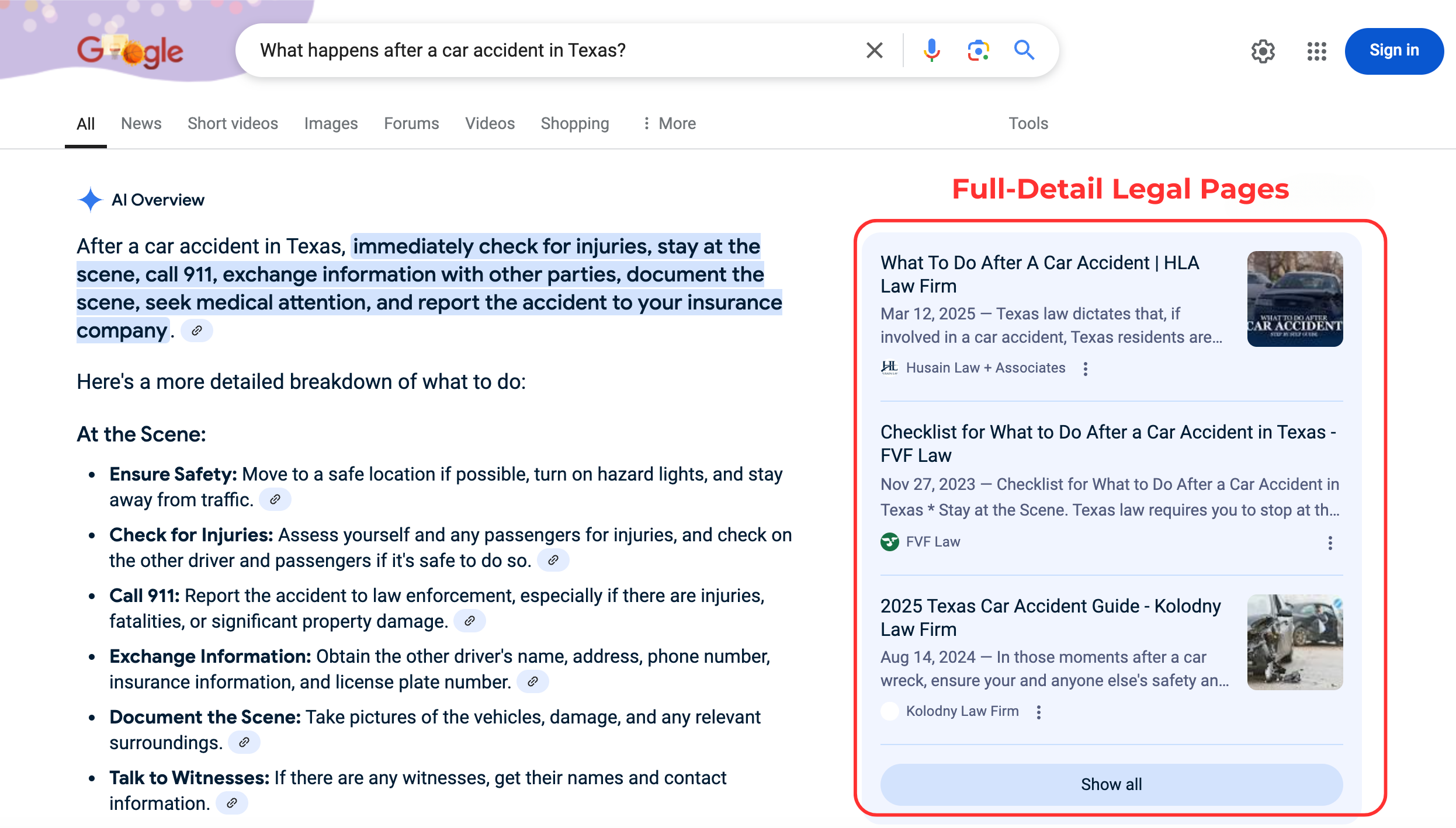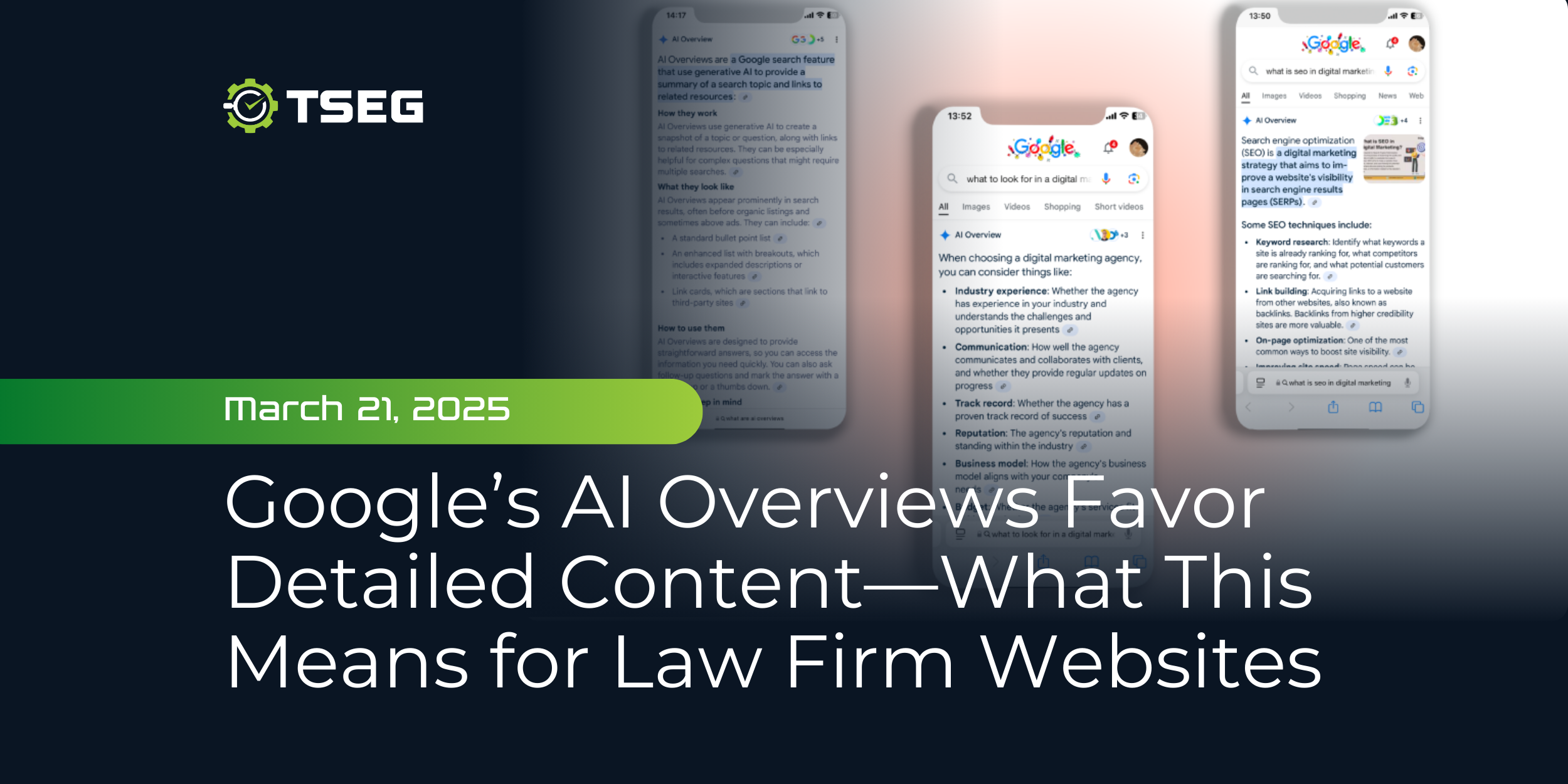Google’s AI Overviews Favor Detailed Content—What This Means for Law Firm Websites
Posted on Friday, March 21st, 2025 at 1:16 pm
The AI Overviews Citation Pattern
Google’s AI Overviews tend to pull from content-rich pages that thoroughly address a user’s query – instead of broad and generic web pages like a site’s homepage. Enterprise SEO company, BrightEdge, found that 82.5% of citations in Google AI Overviews linked to deep content pages, which are pages that are two or more clicks away from the homepage. This means that if your law firm’s website offers pages dedicated to detailed explanations on legal topics—rather than just a list of your services and wins—you’re more likely to appear in AI Overviews.
For example, if someone searches for “What happens after a car accident in Texas?” Google’s AI is more likely to cite a law firm’s blog post that walks through the entire process than a generic personal injury practice page. This pattern aligns with the way Google has been ranking search results in recent years—favoring highly informative, well-structured content over broad, high-level summaries.
Law firms should take this as a signal to refine their content strategy accordingly. The more specific, in-depth, and well-structured your content is, the better your chances of being cited in AI-generated results.

Why This Matters for Law Firms
Potential clients often turn to Google with specific legal questions before deciding to contact an attorney. With AI Overviews increasingly pulling information from deep pages, law firms that provide clear, well-researched answers to common legal concerns stand a better chance of being featured. High-quality blog posts, FAQ sections, and detailed legal guides could be more valuable for visibility than standard practice area pages.
Beyond improving search presence, this pattern also impacts client trust. If a prospective client sees your law firm’s insights highlighted in an AI Overview, it establishes authority before they even visit your website. However, to take advantage of this, law firms must ensure their content is structured in a way that Google can easily interpret.
Schema markup is one tool that helps search engines understand and prioritize content. By using structured data to highlight key details—such as legal definitions, step-by-step breakdowns, or case outcomes—law firms increase their chances of being cited in AI-generated results.
The Risk of Hallucinated Citations
While Google’s AI Overviews generally cite real web pages, there’s a small but notable issue developing: sometimes, they reference URLs that don’t actually exist. Google’s John Mueller recently addressed this, acknowledging that AI-generated content may occasionally fabricate links to pages that were never published.
For law firms, this presents an interesting challenge. Imagine Google’s AI Overview citing your website for a specific legal topic, only for users to find that the linked page leads to a 404 error. While this isn’t a widespread problem, it’s something to monitor—especially for firms that actively invest in search visibility.
Right now, the volume of traffic from these non-existent links is too small to justify a major response strategy. However, law firms should still keep an eye on how their sites appear in AI-generated results. If Google’s AI starts referencing your firm incorrectly, it may be worth considering ways to guide users toward relevant pages once they land on your site.

Best Practices for Law Firm Websites
With Google’s AI Overviews favoring deep, content-rich pages, law firms need to adjust their website strategies to stay visible. Here’s what firms can do to improve their chances of being cited:
- Prioritize Detailed, Informative Content – Blog posts, FAQs, and legal guides that answer specific client questions are more likely to be featured than generic practice area pages. Content should be thorough, well-researched, and easy to read.
- Use Schema Markup – Structured data helps search engines understand the purpose and details of a page. Adding schema markup to legal blog posts, case results, and FAQ pages can improve visibility in AI-generated results.
- Monitor AI Overviews for Mentions – While hallucinated citations are rare, it’s worth checking if your firm is being referenced incorrectly. If you notice an issue, consider creating content that actually addresses the topic being cited.
- Optimize for User Experience – Once visitors land on your site, make sure the content is easy to navigate, clearly answers their questions, and encourages them to stay on your website and contact your firm.
By focusing on these strategies, law firms can improve their search presence and provide valuable resources that potential clients trust.
TSEG Helps Law Firms Stay Ahead in Search
Google’s AI Overviews are changing how legal information appears in search results, and law firms that adapt will have a stronger online presence. Detailed, client-focused content is more valuable than ever. Firms that provide well-structured answers to common legal questions have a better chance of being featured in AI-generated results—giving them greater visibility and credibility.
At TSEG, we specialize in helping law firms create content that ranks and converts. From in-depth legal guides to schema-optimized pages, our strategies align with Google’s latest updates to maximize search performance. If you want your firm to stand out in AI-driven search results and attract more clients, let’s talk.
